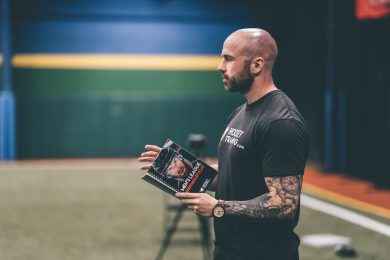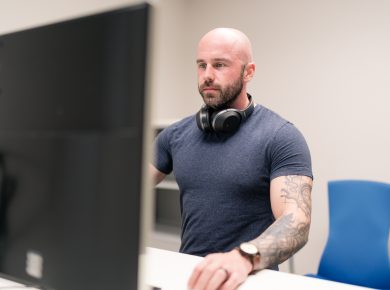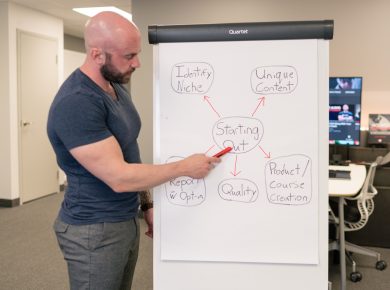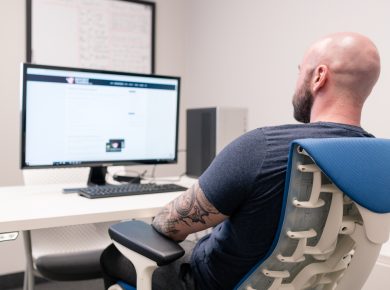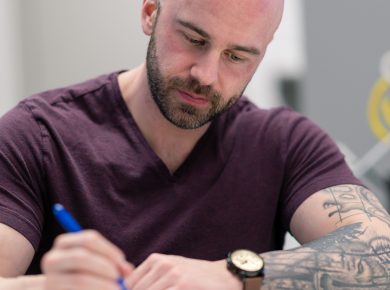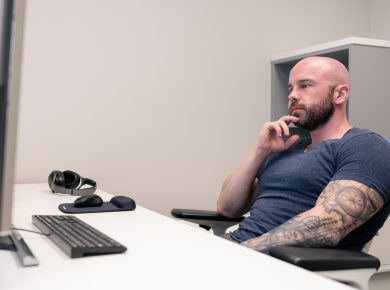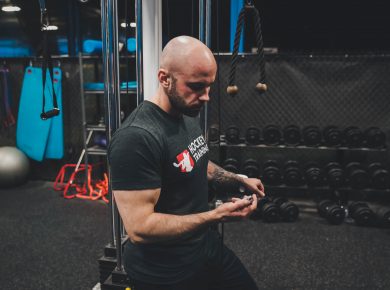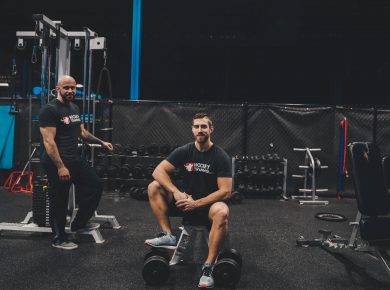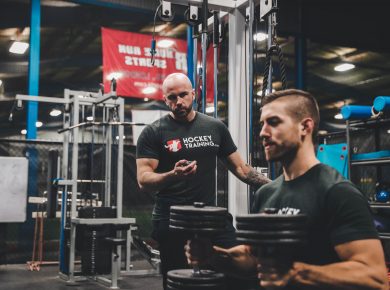Ever since I began my career, even in the super-amateur days of Dan Garner, I always pictured industry coaches in one of three categories:
#1: Personal Trainer
#2: Fitness Professional
#3: Professional Coach
I could have probably came up with more sophisticated names, but it’s stuck with me for whatever reason.
I defined them in my mind on my interpretation of their position in the industry.
The personal trainer is the character at the gym who is a great person and usually helps a lot of general population people with the basics, but never really does any continuing education.
All they did was get their baseline certification and then each year after that only got the minimum amount of educational credits needed to uphold that certification, and the selection of those educational credit courses is usually decided on what’s the cheapest option(s).
Unfortunately, this makes up the majority of the industry.
Next step from there is the fitness professional.
A fitness professional is the “stand out” coach at their gym. They are passionate about fitness, they care about their job and the success of the facility they work in, they always look the part, and they always seem to be educating themselves.
A fitness professional is what you would call a big fish in a small pond.
They have a great reputation and could make a great living doing what they do for the rest of their life, but ultimately no one really knows them outside of their gym — let alone in other countries.
Finally, we have the professional coach.
The professional coach is the big fish in the big ocean.
He/she confidently discusses advanced programming and coaching strategies with anybody in the world and is not afraid to lay out their opinion online because they know it is well supported.
The professional coach is highly sought after on the worldwide scale by fitness professionals because they always want to learn more, and who better to learn from than the authority in the business who can both talk the talk and walk the walk in terms of scientific knowledge and experienced-based application.
Personal trainers may not know the professional coach, but that’s because they’re more worried about what is happening on The Bachelor tomorrow night than how to achieve optimal results for their client.
The professional coach knows this, and shrugs it off because it doesn’t matter. Their ego won’t get hurt like the fitness professional’s might.
They know their world from the outside-in and the inside-out and they are going to keep making the world a better place no matter what.
Cracking the Code
How do we do it then?
How do we move from personal trainer to fitness professional?
And then eventually to professional coach?
I’ll tell you how…
It involves the second word in both the #1 and #3 rankings.
Trainer vs. Coach
These are two vastly different terms, and using these interchangeably ends today.
The modern fitness industry prioritizes content over context, this is a huge mistake.
A “trainer” certification would have you believe that this entire industry is information-based.
Essentially, once you are given the “secret knowledge” that your client wants, you will have everything you need in order for your client to achieve their goals and dreams.
WRONG.
The fitness industry, and coaching in particular, is a relationship-oriented industry. Not an information-oriented one.
In fact, when someone comes to you for help — in almost all cases they have been given too much information, not too little!
Whether your client says it or not, they are looking at you to simplify the equation, not make it more difficult.
If you understand that for what it truly means, you have already left the world of being a personal trainer.
Trainer vs. Coach
What’s funny to me is that the terms “trainer” and “coach” are used interchangeably in our industry, and yet in other industries they have their own clearly defined set of disciplines and roles.
Just look at professional sports.
The NHL, NFL, NBA, and MLB all have both “trainers” and “coaches”.
In professional athletics, the coach is everything, whereas the trainer always answers to the coach — and in many cases has no power over the team either.
Which one do you want to be?
Which one creates the larger impact on the team?
Putting all political correctness aside, any moron can get a personal training certification.
There are certifications that exist that only require one 9-5pm session and then you’re done (and some are even less).
Any certification issued to you that only took a few hours of your time is not worth the paper it is written on. I’ve even had people want ME to write their online exams for them so they could pass.
If you can’t pass your online course, what do you think will happen when you get in the gym?
Seriously?
Because of all this, certified does not mean qualified.
This frustrates the fitness professional to want to “call out” these trainers, but the professional coach, he doesn’t get frustrated.
Instead, he gets inspired.
He sees a gap in the industry and he knows he has the power to change things for the better.
Fitness professionals bitch about the personal trainers, whereas professional coaches lift them up.
No attack needed, that never does anybody any good — and only makes you look like an amateur.
Doing Is Better Than Knowing
Let’s go back to athletics, think about some of the best bodies in all of sports.
Wide receivers, sprinters, gymnasts, fighters, and even all of the best bodybuilders — there is no uniformity in training program design across all sports.
No special training program.
No special supplement.
None of that.
What truly links all of these amazing bodies together is the “doing” of their selected activity, with a long history of being well-coached within it.
I’ve worked with tons of professional athletes and I can tell you first hand that they rarely ever spend anytime at all studying on how to have a great physique, instead, they let the coach decide.
And you know what?
The coach doesn’t make that decision based on what his certification textbook said, but instead he bases it on where the athlete is at and what they need to do next in a simple to understand way.
Can you imagine if instead of allowing baseball players to practice the swing, coaches broke down the raw physics involved in the swing from a mathematical standpoint?
Sound stupid, right?
Well, how about that 20,000 word article you read the other day on how to perform the squat?
Now you know how I feel about it.
Don’t Complicate What Is Simple
Oftentimes trainers, whether they know it or not, intentionally overcomplicate the process so that the client creates a dependency on their “knowledge” (and I use that term very loosely here) and sticks around to pay them more money.
Great coaching bro! You must help a lot of people! Not.
This is a relationship-oriented and service-oriented business, this means you need to address the application rather than add more nonsense to their ever growing mountain of health and fitness “noise” that they have in their head.
Only long-term compliance will lead to success, any real coach knows that. You can try and force compliance for awhile, but again, any real coach knows that has a quick expiry date.
Identify “The Bridge”
Every lecture and seminar you attend, you always have to look for “the bridge”
This is a bridge that will take you from information to application.
Essentially, look at the titles of all the lectures at a symposium and ask yourself:
Does this have any relevance to my clients?
Can ANY of this be applied?
Or, are we just debating about small details to sound smart?
If you want to reach the heights of becoming a professional coach stop overly obsessing about the content and start narrowing in on the context.
Your application skills need work, and so do your clients.
So, why do you keep learning new stuff you’ll never use?
Final Thoughts
Leadership skills are what coaching is all about, and that trumps “information” every single time.
Especially as far as long-term career success is concerned.
Domain knowledge is incredibly important, don’t get me wrong. But keep it in your domain, and make sure you can always find the bridge.
Why?
Because domain knowledge is just one of many skills that the professional coach has. He/she is also excellent with their people skills, emotional maturity, and emotional intelligence.
These skills allow you to use your domain knowledge at the right time in the right place, and get your client to actually follow up on that arrangement.
Professional coaches know something that fitness professionals and personal trainers don’t…
They know that this game is 50% art and 50% science.
This industry tends to be infatuated with the science right now, this means you have the opportunity to put art front row center and separate yourself from the pack.
Training is about science, coaching is about art.
Once you understand the rules of science strong enough to break them like an artist, you will become a Professional Coach.
—
If you want help in this area so you can put yourself on the fast-track to becoming a Professional Coach someday soon, check out the Create Freedom Academy and let’s get started today.
